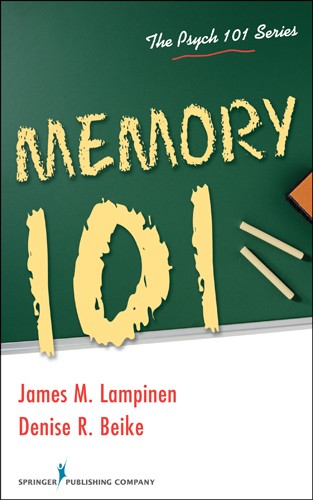In their new textbook, Memory 101, James M. Lampinen and Denise R. Beike of the University of Arkansas Department of Psychological Science provide an overview of theories and research on human memory from a psychological perspective.
“Memory is a foundational mental ability, important in its own right, but also important in the role it plays in other mental functions,” they write. “To understand memory is to understand much of human psychology.”
In addition to the theories and research on memory, Lampinen and Beike deal with memory as an everyday activity, including memorizing things, remembering to do things via prospective memory, and recalling how to do things. They also examine memory disorders, such as Alzheimer’s and amnesia, as well as exceptional memory skills.
The authors address aspects of memory that involve the legal world, including the issue of repressed and recovered memories, the validity of memory in courtroom testimony, and the effects of remembering traumatic events.
Memory 101 is part of the Psych 101 Series, published by Springer Publishing Co., a series that introduces most specializations within psychology. Lampinen and Beike point out that every book in the series deals with memory in one form or another.
“Interested in intelligence?” they write. “Intelligence requires recalling information to reason about it and recalling reasoning strategies and heuristics that have worked in the past. Interested in depression? People with depression have memory biases that cause them to focus on negative life events. Interested in language? Language requires a memory for words and grammar, as well as tying together clauses with prior clauses stored in memory. Interested in social cognition? Social cognition requires accessing memory for information one has stored concerning other people. There is no aspect of human psychology that does not depend crucially on memory.”
Lampinen is professor and associate chair of the Department of Psychological Science. His research focuses on memory errors and their applications in legal contexts. This includes eyewitness testimony, memory illusions, and the use of prospective person memory in searches for missing or wanted persons.
Beike is professor and chair of the Department of Psychological Science. In her research, she looks at the effects of autobiographical remembering on emotions, the self-concept, relationships, and behavior. She also studies the emotional experiences of regret and missing someone, both of which involve memory.
Contacts
James M. Lampinen, professor and associate chair
Psychological Science
479-575-5802, lampinen@uark.edu
Denise Beike, professor and chair, psychological science
J. William Fulbright College of Arts and Sciences
479-575-4256, dbeike@uark.edu
